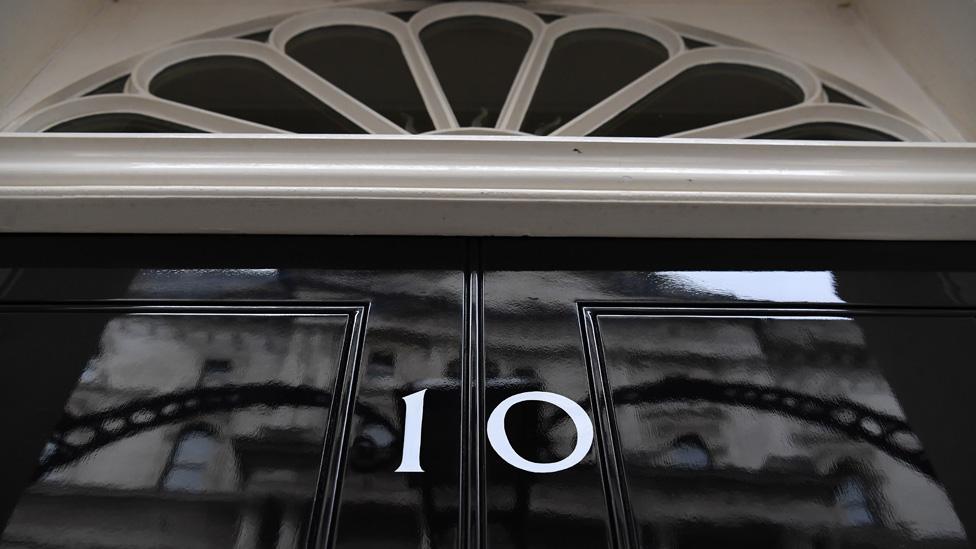Another moment of political transformation awaits
- Published
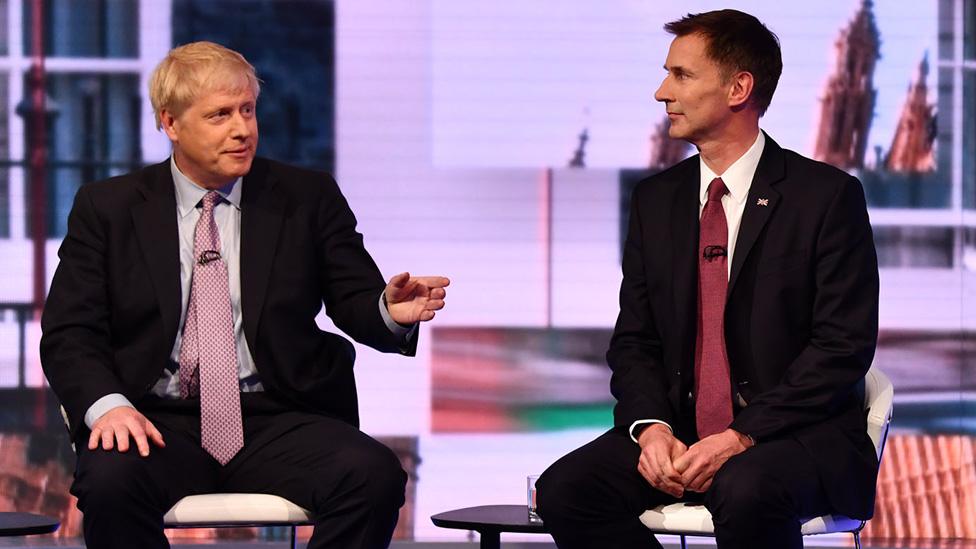
Nearly four years ago, we took the first steps on a path of enormous change in our politics.
The unexpected began to happen.
Conventions frayed. Those who had held the reins for years in our major political parties lost their grip.
In September 2015, Jeremy Corbyn stormed the Labour leadership, exciting a phalanx of new and old Labour supporters.
In June 2016, David Cameron lost the EU referendum.
Despite the signs that were blatantly obvious during that campaign the result was an intense shock to most people who worked in and around Westminster.
In the chaos that followed, Theresa May found her moment and moved in to Number 10.
Then in June 2017, again, the public reminded the political class who was in charge, and surprised them by removing the Tories' majority, making a tricky job of governing precarious, changing everything for the Prime Minister who held on, only just.
We are now on the verge of the fourth moment of transformation in those four years: Tomorrow morning the name of the new prime minister will be announced.
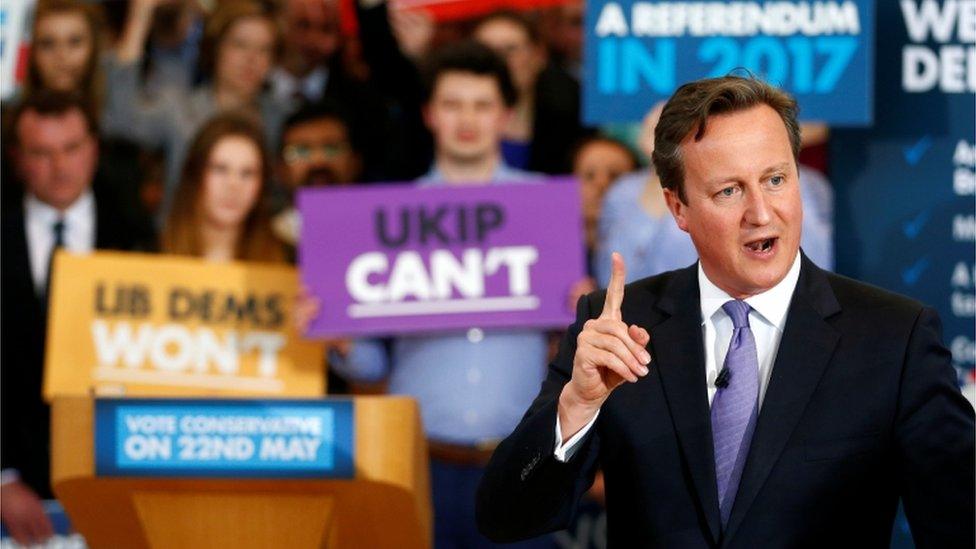
The UK is set to have its third prime minister in little more than three years
Unless Conservative members are an entirely duplicitous bunch, the name that is read will be Boris Johnson.
A man whose career has been at the top, then in the trash, but whose ultimate belief in himself, and his ability to get others to buy into that, is about to land him in the very highest office in the land.
A man whose dream of power, which he has tried continually to deny, has been obvious for more than a decade.
A man who many voters adore, but who repels others.
A man who some, even in his own party, believe is a nightmare.
A man who has what might politely be described as an "unusual relationship with the truth", as one official told me.
But he captures the attention of voters in a way so few politicians do, prompting members of the public to be near him, whether to scream insults or to shake his hand.
But just as there are wildly varying interpretations of his character, his values, and motivations, so there are wildly varying guesses as to how he will answer the big questions that will face him in office, if, as expected, he walks across the threshold of Number 10 on Wednesday afternoon.
Most intense among the demands are how he will cope with Brexit. That is the conundrum that has given him this chance. And the conundrum that may yet be impossible to solve.
A new deal
Is there really any chance of getting a different deal with the EU despite their repeated protestations to the contrary?
If he cannot, would he really launch the country out of the union with no formal arrangement in place, given the warnings about the risks of doing so?
Would he be willing to send MPs home and close down Parliament temporarily to get round the howls of protest from the green benches if he tries?
Would he call an election to get his way?
Mr Johnson has spent the last few weeks selling his standard brew of gags and promises in the campaign, and has visibly tried to keep options as open as he can, other than sticking firmly to the vow to leave the EU at Halloween.
That has been the main difference between him and Jeremy Hunt, his rival candidate.
And in a campaign that came about because of a failure to leave the EU, it is not surprising that the concrete guarantee to do that is the one absolute promise he has given.
For his most ardent Brexiteer supporters, they have him exactly where they want him, "in a box", as one describes, with sticking to the deadline "his only way out", even if it means leaving with no formal arrangement to start with.
When it comes to those other questions, the answers make less compelling headlines, but the truthful responses are: It depends.
Mr Johnson says he wants a different deal with the EU.
They say overtly there is no chance of reopening the existing withdrawal agreement.
But Mr Johnson is asking for something else - what his backers describe as a basic free trade deal, perhaps even a four-page statement of intent about how the EU and the UK would do business with each other in the future.
Once that is done, so the plan goes, there would be a "standstill", or a period where not that much changes but the UK leaves the union at the end of October.
In its most basic sense, we leave in a few months' time, both sides agree to do business sensibly with each other, and promise to sort out the hard stuff, like the Irish border, over a period of a few years.
Before you scream, there is a very long list of quibbles with this plan. Not least, you might wonder, if it is that easy, why on earth has it not been done already?
The EU has said repeatedly that they would not and could not accept any kind of deal without a solution for the Irish border being settled first.
And there are also disagreements inside the varied tribes that make up Team Johnson these days, even if their man can persuade the EU to think again.
Some of them believe that during the standstill period in the UK it would be fair enough, and worth the political pain, to accept the oversight of the European Courts for a while.
For others that is absolutely toxic.
Some of his supporters believe it is possible that an outline deal could get through Parliament in time with a straightforward thumbs up or thumbs down vote - an un-amendable statutory instrument, to use the technical term.
Others cannot believe that is workable.
But a new prime minister will bring a new mandate at home and creates a new political moment abroad.
One senior EU diplomat told me "we see Boris as an opportunity".
Don't get me wrong, they are not champing at the bit to tear up two years of hard work and make things happen for the former foreign secretary who perplexed them.
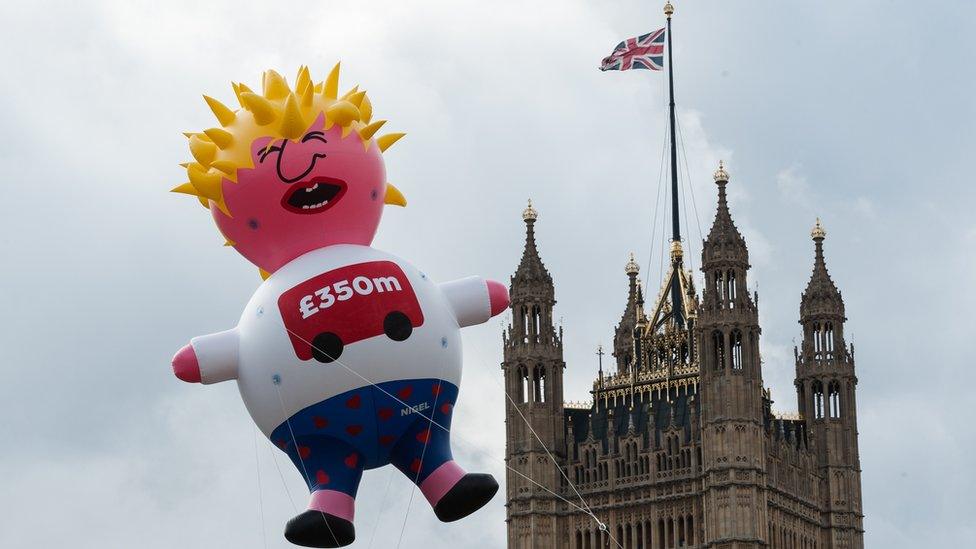
A blimp of Boris Johnson was deployed at a protest directed against Brexit and the leadership frontrunner
But there is an acknowledgement that the political situation is about to be reset and those on the other side of negotiating table have of course been thinking about possible ways through.
It is going to take a lot more than a mini-break to Berlin, a weekend at President Macron's fort in the baking heat of the Cote D'Azur, or a few Pimms on the terrace at Chequers.
A new kind of deal, that could get then get through Parliament in 100 days, seems very unlikely, but it is not completely out of the question - it depends.
With the chances of a new agreement so small and the promise to leave on 31 October so big, other vexed questions arise about how Parliament would react to a prime minister determined to take us out.
Would they be able to stop a still hypothetical Prime Minister Johnson ramming through departure without a formal deal?
A band of new rebels are lying in wait, leading to the bizarre spectacle of cabinet ministers chucking themselves over board before they get shoved.
Some ardent backers of Mr Johnson believe that even so, he might be able to get Parliament on side for such a departure, or at least they could run the numbers close.
There is a sprinkling of Labour MPs committed to getting it done, and do not underestimate the passions on the Tory side, including among some who think it is all a nightmare but they just want it to be over.
It is impossible right now to predict how every MP would vote, but a Johnson government trying to take us out without a deal would at the very least meet very fierce resistance.
That is why there has been frantic speculation about whether he would even consider temporarily closing down Parliament in order to get Brexit done.
(That sounds crazy, but as the law stands we are leaving on 31 October, and if MPs are not sitting in the House of Commons they cannot change the law to stop it).
Team Johnson will not rule that out, as they will not rule out any of the emergency rip cords they might have to pull to stick to their deadlines.
But it is not the plan.
The way to get round it may be much less dramatic, if almost as controversial, in the Commons.
Several in Johnson's circle admitted they do not plan to send Parliament home, but instead hardly to put forward any legislation, if indeed any at all.
One of his senior backers suggested they in fact would not try to have any discussion or votes on any laws at all before Halloween. That sounds technical.
But the government controls what new laws are voted on in the House of Commons.
And if they do not put any forward before 31 October, including none that could possibly have anything Brexit related tagged on to it, or amended, then MPs who want to stop us leaving without a formal deal simply will not have the chance to vote to do so.
That is why earlier this year there was such controversy when Labour MP Yvette Cooper and others tried to grab control of the business in the Commons, so they could decide what got voted on and passed.
A vigorous debate
And it is why one of Team Johnson joked last week that their chief whip might find ways of keeping MPs busy with general debates on all sorts of trivia, but they would not give them anything to vote on, so they would not have a chance to block Brexit from happening on time.
And it is why others in his camp say there is a vigorous debate inside over what bits of legislation would be absolutely vital if we are to leave without a deal, and what you could do without.
So would Boris Johnson suspend Parliament for a while to get Brexit done? The answer again seems, in one way or another, it depends.
And because the answers to those still hypothetical questions still are "it depends", it is likely that he will before long find himself in a similar kind of agony to Theresa May - without a plan that can pass Parliament.
That is why there is also frenzied speculation over whether he is planning secretly to bring about an election.
Guess what? Here, too, there are different tribes of opinion.
Certainly, there has been discussion that, without a majority, with Labour in despair, with a rocky road ahead on Brexit, it would be wise to move into a campaign as soon as possible, using the new mandate and new moment of change to try to improve the odds of success.
But more voices in Johnson's camp caution against pursuing a public vote until Brexit has actually happened. It is familiar to hear a plan of chunky spending promises in the autumn, a departure from the EU however it happens, then an election that "becomes viable from the spring".
On the edge
But if Parliament defies the new government in the autumn, the circumstances could feel different, indeed.
What we do know is after four years we are entering perhaps an even more unpredictable period - whether you are thrilled or horrified, understand, we are on the edge of another great change.
One of the cabinet ministers who is likely to be packing up their office shortly quipped as they talked in disbelief about the mess of the last few years, that "by Christmas it might be Johnson, Corbyn, even prime minister Cooper, Letwin or Swinson" - knowing, as they tried to make light of their despair, that they weren't really joking at all.
Who or what will happen?
The answer, of course - it depends.
- Published23 July 2019
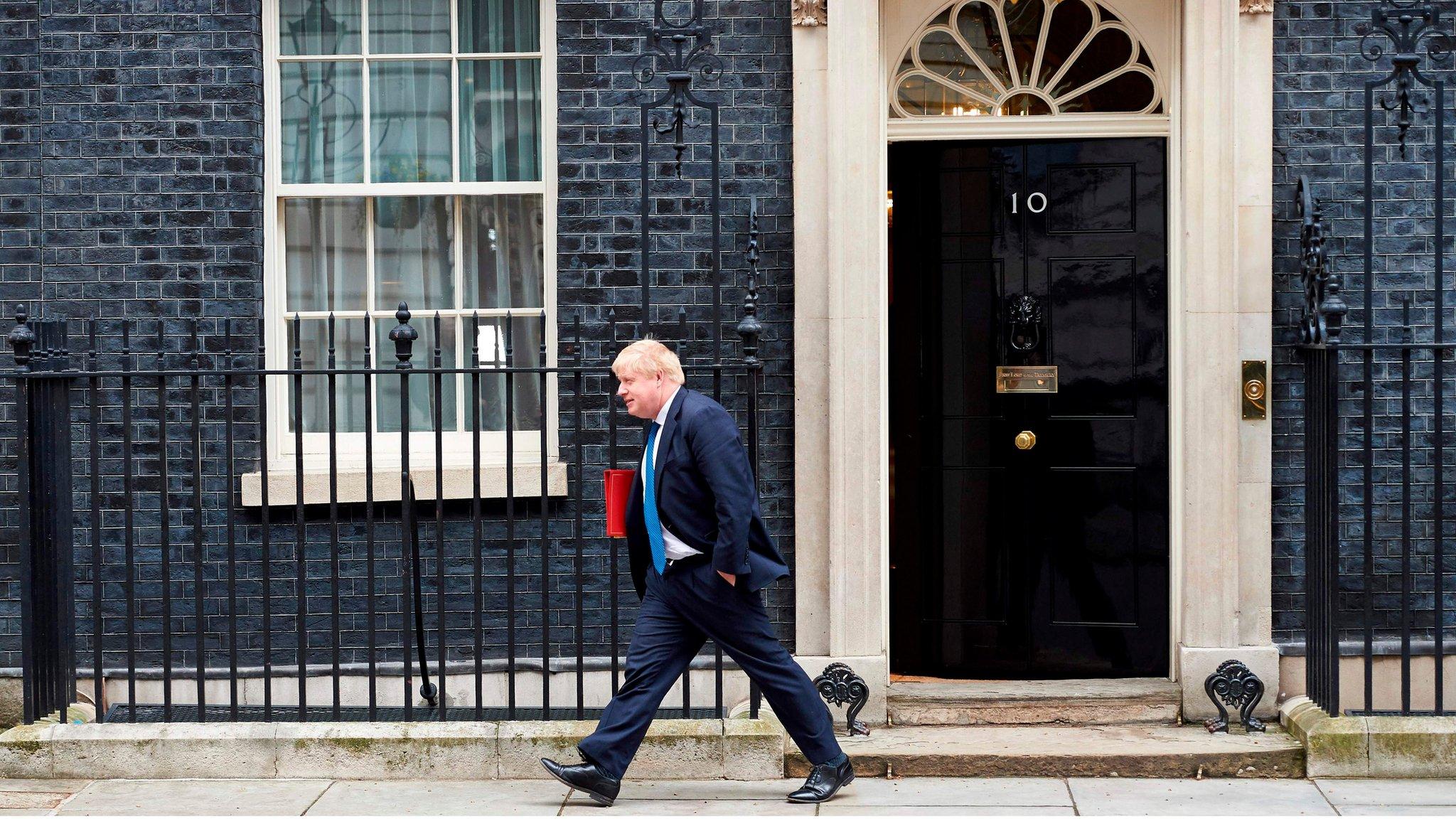
- Published1 February 2019

- Published25 July 2019

- Published18 July 2019
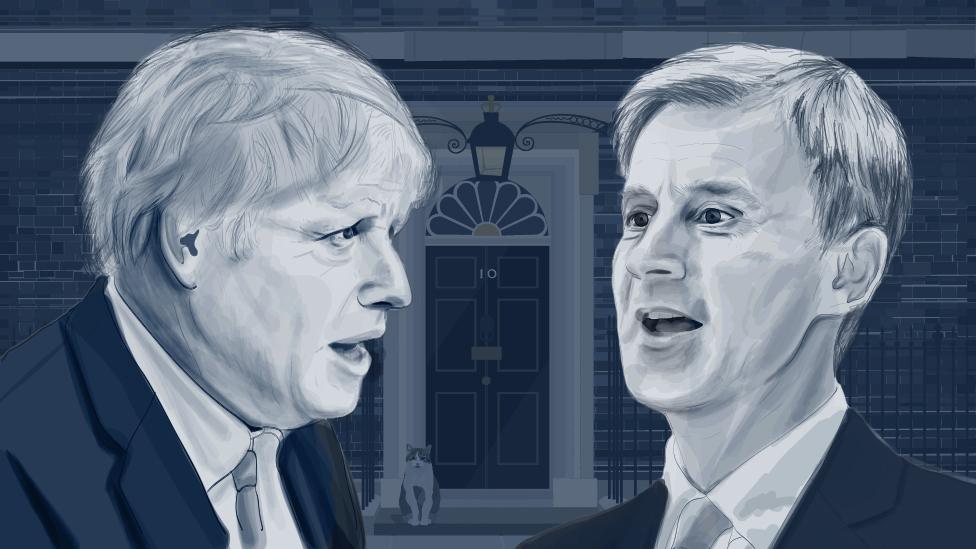
- Published23 June 2019
